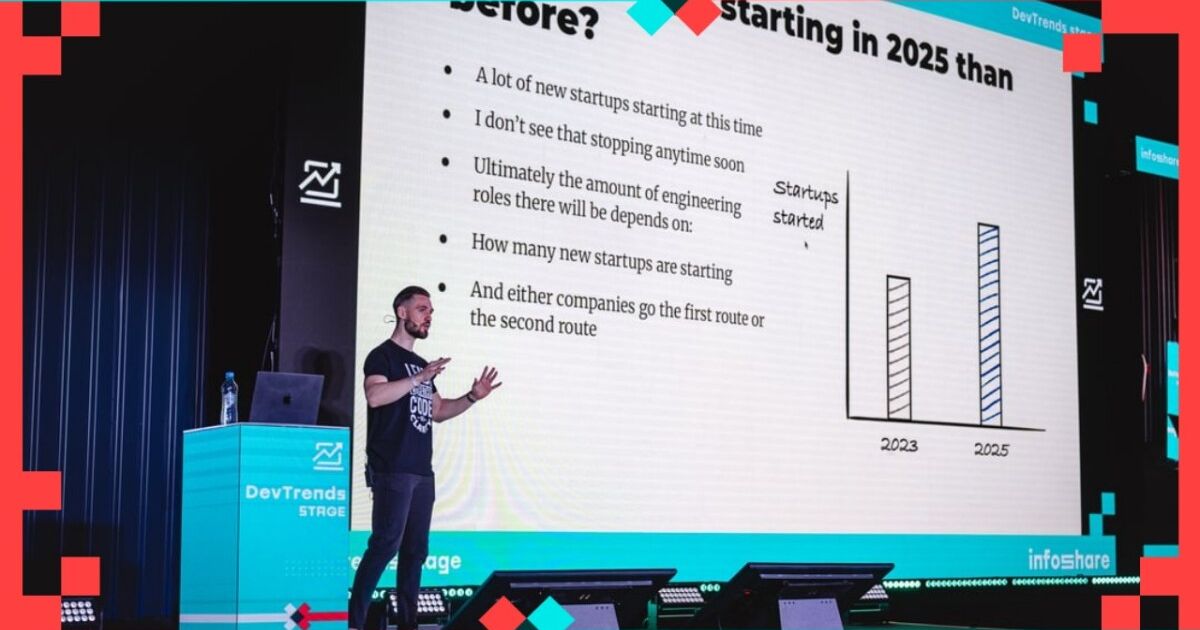VIEW SPEECH SUMMARY
Industry Trends:
- Companies choose between fewer people with higher productivity (common in AI product companies) or more people with increased productivity.
- Startups are increasing in number, fueling engineering job availability.
- Junior engineers often have AI tool knowledge but lack deep engineering fundamentals and best practices.
- Human skills such as communication, leadership, teamwork, empathy, and problem-solving will remain critical and irreplaceable by AI.
Key Skill Areas to Focus On:
1. Human-Related Skills:
- Leadership: Cultivate a leadership mindset by helping others and adding value beyond individual contribution.
- Teamwork: Be a proactive team player who helps solve hidden organizational problems and inspires collaboration.
- Communication: Develop strong verbal and written communication; learn to "read the room" and speak in terms understandable to non-technical stakeholders.
- Being a Great Colleague: Be reliable, consistent, open to feedback, proactive, and supportive.
- Empathy & Emotional Intelligence: Write clear code others can understand and focus on building the right things; foster collaboration by valuing collective problem-solving over winning arguments.
2. Problem-Solving Skills:
- Pragmatism: Gain varied problem-solving experience; seek simple, effective solutions.
- Resourcefulness: Use AI tools and diverse information sources wisely; maintain a network of experts for advice.
- Utilize AI Tools: Be aware of available tools and use the best one suited for each problem (e.g., Cursor for coding, Perplexity for research).
3. Product and Business Understanding:
- Engage with product managers and business stakeholders by asking questions to understand business goals.
- Build and monetize side projects to appreciate challenges in marketing, sales, and user acquisition.
- Engage in freelance work to practice requirement analysis and proposing better solutions.
- Develop both deep expertise and broad knowledge across engineering domains.
4. Communicating Impact:
- Keep a "blacklist of wins" documenting achievements to share with managers.
- Share progress updates, not just final results, to highlight effort and process.
- Share expertise internally and externally (e.g., blogging, newsletters) to build credibility and influence.
Actionable Items:
- Focus on developing leadership mindset and teamwork skills, regardless of formal role.
- Improve communication skills, both written and verbal; practice concise and audience-aware messaging.
- Cultivate empathy and emotional intelligence in coding and collaboration.
- Actively solve diverse problems to improve pragmatism and resourcefulness.
- Explore and integrate AI tools relevant to daily work.
- Engage deeply with business and product understanding through questioning and side projects.
- Document and communicate your achievements clearly to stakeholders.
- Share knowledge broadly inside your organization and publicly to build credibility.
- Scan the provided QR code to access 30 curated resources for further development.
- Contact the speaker via email to receive a complimentary one-month subscription to their leadership newsletter.
- Companies choose between fewer people with higher productivity (common in AI product companies) or more people with increased productivity.
- Startups are increasing in number, fueling engineering job availability.
- Junior engineers often have AI tool knowledge but lack deep engineering fundamentals and best practices.
- Human skills such as communication, leadership, teamwork, empathy, and problem-solving will remain critical and irreplaceable by AI.
Key Skill Areas to Focus On:
1. Human-Related Skills:
- Leadership: Cultivate a leadership mindset by helping others and adding value beyond individual contribution.
- Teamwork: Be a proactive team player who helps solve hidden organizational problems and inspires collaboration.
- Communication: Develop strong verbal and written communication; learn to "read the room" and speak in terms understandable to non-technical stakeholders.
- Being a Great Colleague: Be reliable, consistent, open to feedback, proactive, and supportive.
- Empathy & Emotional Intelligence: Write clear code others can understand and focus on building the right things; foster collaboration by valuing collective problem-solving over winning arguments.
2. Problem-Solving Skills:
- Pragmatism: Gain varied problem-solving experience; seek simple, effective solutions.
- Resourcefulness: Use AI tools and diverse information sources wisely; maintain a network of experts for advice.
- Utilize AI Tools: Be aware of available tools and use the best one suited for each problem (e.g., Cursor for coding, Perplexity for research).
3. Product and Business Understanding:
- Engage with product managers and business stakeholders by asking questions to understand business goals.
- Build and monetize side projects to appreciate challenges in marketing, sales, and user acquisition.
- Engage in freelance work to practice requirement analysis and proposing better solutions.
- Develop both deep expertise and broad knowledge across engineering domains.
4. Communicating Impact:
- Keep a "blacklist of wins" documenting achievements to share with managers.
- Share progress updates, not just final results, to highlight effort and process.
- Share expertise internally and externally (e.g., blogging, newsletters) to build credibility and influence.
Actionable Items:
- Focus on developing leadership mindset and teamwork skills, regardless of formal role.
- Improve communication skills, both written and verbal; practice concise and audience-aware messaging.
- Cultivate empathy and emotional intelligence in coding and collaboration.
- Actively solve diverse problems to improve pragmatism and resourcefulness.
- Explore and integrate AI tools relevant to daily work.
- Engage deeply with business and product understanding through questioning and side projects.
- Document and communicate your achievements clearly to stakeholders.
- Share knowledge broadly inside your organization and publicly to build credibility.
- Scan the provided QR code to access 30 curated resources for further development.
- Contact the speaker via email to receive a complimentary one-month subscription to their leadership newsletter.
Future proof your career as an engineer in Gen AI world
10:00 - 10:30, 28th of May (Wednesday) 2025 / DEV TRENDS STAGE
Learn about the timeless skills and competencies that will always be highly worth. Focusing on these skills will ensure that you future proof your career.
Gregor will also be sharing where he sees the engineering industry heading and what particular things engineers and engineering leaders should do to have a lot of opportunties in 2025 and beyond.
LEVEL:
Basic
Advanced
Expert
TRACK:
AI/ML
Career Path
TOPICS:
AI
SoftwareEngineering
WebDev



